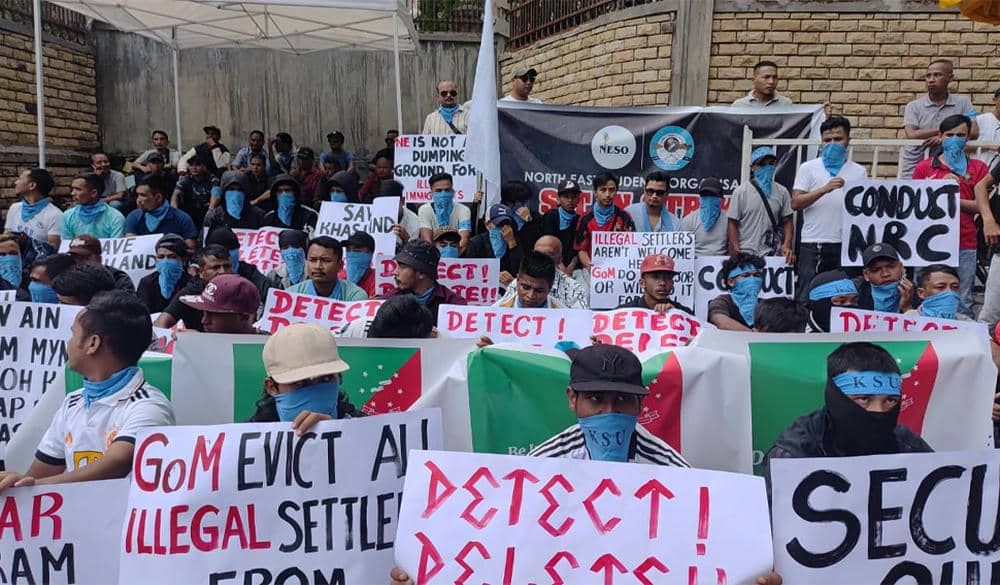NESO demands Meghalaya seal Indo-Bangla Border to stop illegal migration

The North East Students’ Organization (NESO) has demanded that the Meghalaya government seal the Indo-Bangla border and implement strict measures for the immediate detection and deportation of illegal migrants.
In a memorandum submitted to Chief Minister Conrad K. Sangma, NESO also urged the government to strengthen border control and monitoring, particularly in vulnerable areas, by deploying adequate security personnel and modern surveillance technology.
It emphasized the need for the government to coordinate with neighbouring states and relevant agencies to ensure that migrants are not simply relocated within the region, thereby preserving and protecting indigenous rights, culture, language, political representation, and land ownership through appropriate legal safeguards and policy measures.
NESO also demanded the setting up of a Special Review Committee to address population explosion in certain areas.
“We urge the Government of India and all concerned state governments to treat this issue with the seriousness and urgency it demands. The demographic and cultural changes already visible in parts of our region are warnings of an existential crisis. If strong and sustained measures are not taken now, the very identity of the North East’s indigenous peoples could be irreversibly altered,” NESO chairman Samuel B. Jyrwa stated in the letter.
He added that for decades, the North East has been grappling with the challenge of uncontrolled and unchecked influx of illegal migrants. This problem began soon after India attained Independence in 1947 and has, over time, grown into one of the most pressing threats to the socio-cultural fabric, demographic balance, and political stability of the states.
Stating that the consequences have been devastating, Jyrwa cited Tripura as the most alarming example—where indigenous people, once the overwhelming majority, have now been reduced to a minority in their own ancestral land. Assam too has suffered immensely, leading to the historic six-year-long anti-foreigners’ movement that culminated in the signing of the Assam Accord in 1985.
Yet, despite the sacrifices and struggles of countless individuals, the promises of this accord have not been fully realized, and illegal migration continues unabated.
Jyrwa also stated that Meghalaya has faced repeated waves of agitation—in 1979, 1987, and the early 1990s—all triggered by fears of demographic displacement and erosion of indigenous rights.
“Today, the problem has only deepened, and Assam is witnessing a radical change in the demographic structure of the state. This shift is not confined to one state—it is spilling over into others, notably the plain belt areas of the Garo Hills in Meghalaya, as well as other parts of the North East,” he added.
NESO has repeatedly placed this issue before the Government of India, urging concrete and sustained measures.
“Unfortunately, the responses have been inadequate, often limited to temporary or reactionary steps rather than comprehensive, long-term solutions. The absence of decisive action has left indigenous peoples vulnerable, and in many cases, they have been forced to fend for themselves in protecting their rights, culture, and identity,” Jyrwa said, emphasizing that NESO will remain committed to continuing its engagement with the Government of India for a concrete and decisive solution to safeguard the future of the North East and its people from this onslaught.
NESO also stressed that this is not merely a political or administrative issue—it is a matter of survival for the indigenous communities of the North East.
“It is also important to note that state governments bear a significant responsibility in this matter. States where the Bengal Eastern Frontier Regulation, 1873, is not applicable are especially susceptible to infiltration and must adopt robust mechanisms for prevention, detection, and deportation of illegal migrants. Border management, inter-state coordination, and local vigilance must be strengthened without delay,” Jyrwa further asserted.





Leave a Reply